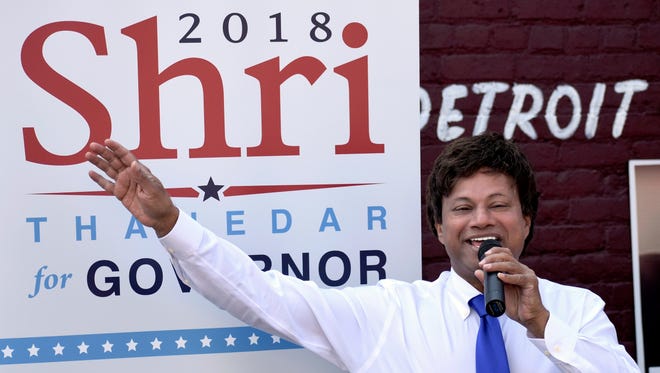‘No regrets’ for Thanedar after putting $10.6M into campaign
 Jonathan Oosting
Jonathan Oosting
Lansing — Ann Arbor entrepreneur Shri Thanedar said Thursday he has “no regrets” after pumping $10.6 million of his own money into his Michigan gubernatorial campaign but finishing last in the Democratic primary.
Thanedar narrowly won Detroit and captured 199,344 votes overall, but he finished third out of three candidates in the statewide primary. While it’s not yet known if his campaign spent the full $10.6 million he poured into the race, doing so would have cost him about $53 per vote.
“I’m very passionate about serving and winning the governorship, and I think it was well worth it,” Thanedar told The Detroit News. “It’s a democratic process. I did my best and so did the other candidates. Voters had the ultimate say and they chose who they chose.”
Thanedar captured 17.7 percent of the statewide vote in the Democratic primary, according to unofficial results from the Michigan Secretary of State’s Office. Former state Senate Minority Leader Gretchen Whitmer of East Lansing handily won the nomination with 52 percent of the vote, followed by former Detroit health director Abdul El-Sayed at 30.25 percent.
Thanedar, who founded and sold a chemical analysis company in Ann Arbor, often said he is not "Rick Snyder rich" but ended up outspending the term-limited governor. Snyder put roughly $6 million of his own money into his primary campaign in 2010.
Republican businessman Dick DeVos had put $16 million of his own money into his 2006 campaign through the August primary but faced only minimal opposition from a write-in candidate, according to state records.
In Tuesday’s Republican primary, Saginaw obstetrician Jim Hines put roughly $2.6 million of his own money into the race. Like Thanedar, he finished last in the primary, pulling in 11 percent of the vote in a four-way race won by Attorney General Bill Schuette.
While it’s not clear if his campaign spent every dollar, the $2.6 million investment by Hines cost him roughly $25 per vote. Post-primary campaign finance statements are due to the state Sept. 6.
Hines was not immediately available for comment.
The Saginaw doctor joined Schuette, Lt. Gov. Brian Calley of Portland and state Sen. Pat Colbeck of Canton at a GOP Unity rally on Wednesday evening in Grand Rapids. Vice President Mike Pence headlined the event, urging Republicans to join forces for the fall election.
Democrats held their own unity lunch Wednesday in Detroit. Thanedar and El-Sayed, who had clashed with Whitmer in the final days of the campaign, pledged to support her in the November general election.
Thanedar said he has not yet talked to the Whitmer campaign about how he could help. The gubernatorial campaign was his first, and he’s not yet sure whether he’ll consider a future run for political office.
“I haven’t planned for anything at all,” he said. “Right now, I don’t have a plan B.”
Thanedar flooded the state with television commercials, glossy mailers and billboards in the run-up to the primary. His aggressive spending has put this year’s gubernatorial race on pace to be one of the most expensive in state history.
Candidates and outside groups had already pumped about $42 million into the race through late July, according to the Michigan Campaign Finance Network. The 2006 matchup between incumbent Democratic Gov. Jennifer Granholm and Republican DeVos drew about $79 million through the November general election.
Whitmer had raised more than $6.2 million through July 22, and an outside group that ran ads to support her had raised more than $2.2 million through June 30, according to state and federal disclosure reports.
Schuette’s campaign had raised roughly $5 million through July 22, and a super political action committee supporting him had raised nearly $2.4 million through July 20.
Thanedar said he was proud of his performance in Detroit, a Democratic stronghold where he beat Whitmer by roughly two percentage points.
“I enjoyed it,” he said of the bruising primary process. “I learned a lot, met a lot of people, and I think we ran a good campaign.”
joosting@detroitnews.com
(517) 371-3662